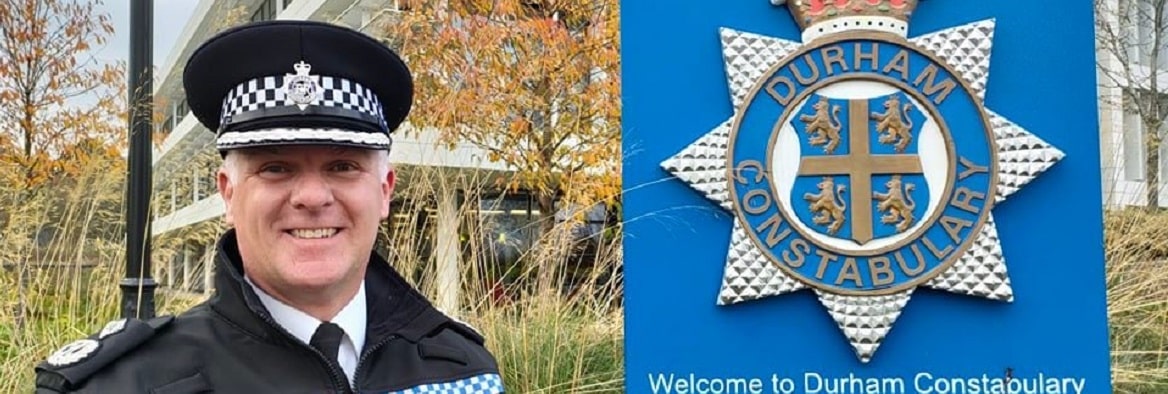
Durham Police Deputy Chief Constable Ciaron Irvine has been appointed as the national lead for security systems.
Irvine will oversee the National Police Chiefs’ Council Security Systems Group and associated Security Systems Policy, which monitors police strategies and technical developments and advises on police requirements in respect of security systems.
Born in Liverpool, Irvine initially moved to the north-east to study at Durham University prior to joining the police service in 1994.
His family has strong links with policing over many generations, with many of his close relatives serving as police officers or elsewhere in public service as health professionals.
Ciaron began his career at Cleveland Police where he worked in mainly uniform and specialist operations/support roles, including time as Head of the force Control Room, Criminal Justice and as a District Commander.
As a Chief Superintendent in Cleveland, he set up the Force Tasking & Coordination Command, learning lessons from the Durham model at the time.
In that role he had responsibility for daily operational tasking, the management of intelligence and force performance.
He is an accredited firearms, public order and multi-agency gold commander with experience of major public and sporting events at all levels.
More recently, Irvine served as Temporary Assistant Chief Constable in both Cleveland and North Yorkshire, before moving in November 2021 to become Deputy Chief Constable at Durham Constabulary.
As well as being the NPCC lead for security systems, he is national NPCC lead for prosecutions and case file progression, and North East regional lead for prevention.
A keep-fit fanatic through regular football, gym and dog walking, he is married to a primary school teacher and the couple have two adult sons.
Irvine said: “Security systems are one of the many essential tools in the fight against crime, and in particular burglary, theft and robbery. Academic research shows professionally installed and maintained alarm systems provide a greater deterrent and properties fitted out with them are less likely to be targeted by criminals.
“I’m pleased to take up this role, working with industry and the service to further reduce unnecessary activations, improve standards and relationships across all parties and ultimately improve safety and reduce susceptibility to crime for those engaged with the scheme.”
NPCC Security Systems Policy
The National Police Chiefs’ Council (NPCC) Security Systems Policy is a public document designed to provide details of how and when the police will respond to security system activations. It also sets out the technical and procedural requirements that the private security industry, involved in providing the installation, maintenance and monitoring of such systems, must follow in order to gain a police response to a security system on behalf of their customers.
The NPCC Security Systems Group work closely with the national alarm inspectorate bodies and trade organisations for the security industry – the National Security Inspectorate (NSI); the Security Systems and Alarms Inspection Board (SSAIB); the Fire and Security Association (FSA) and the British Security Industry Association (BSIA). This work seeks to progress a partnership approach with the private security industry, specifically to improve the performance of security systems and increase the preventative impact and detection rate emanating from such systems.
Since 1995 there have been 1.1 million fewer calls to police to respond to false alarms or alarms involving faulty equipment, reducing from 1,188,386 in 1995 to 85,146 in 2020 despite the number of registered alarm systems almost doubling. The number of burglaries from properties with police compliant security systems has also reduced significantly from 135,990 in 1995 to 11,109 in 2020.
Compliant alarm systems
The police will attend an alarm signal from a monitored alarm as long as the system complies with the aforementioned NPCC Security Systems Policy, which details how the system is installed, monitored and maintained. It also requires security companies providing this service to be approved by an Independent Inspectorate Body – the NSI or SSAIB and registered with the local police force.
Therefore when choosing an alarm system, it is recommended that you should only use an alarm company which is approved by one of the Independent Inspectorate Bodies. Anyone can check out an installer’s credentials on the Inspectorates’ websites to ensure that a security company has the correct certification to install intruder alarm systems. https://www.policesecuritysystems.com/